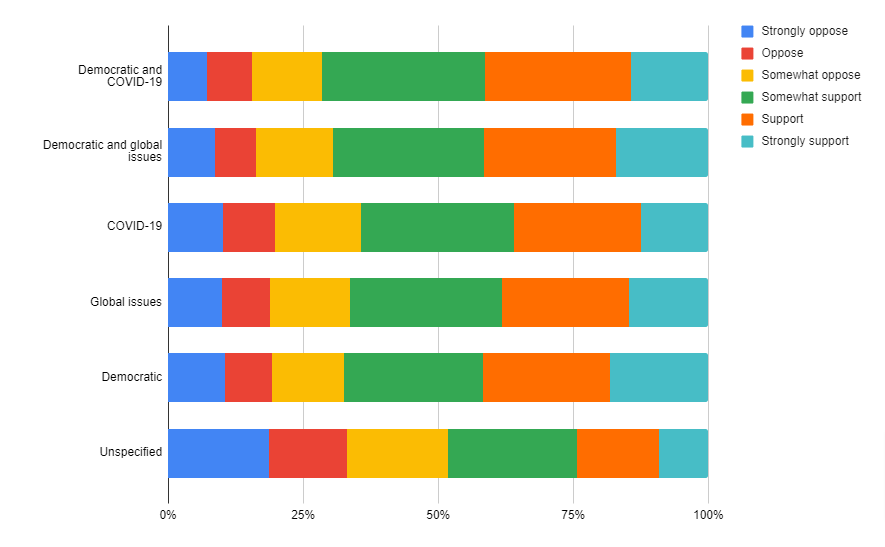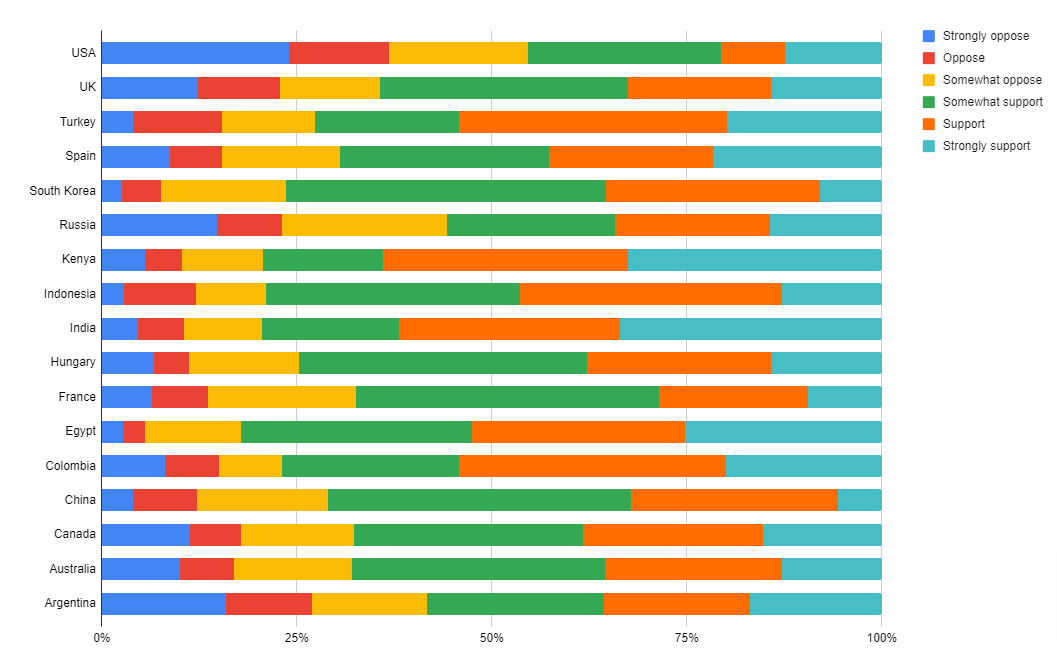
Image: Dignitaries stand behind symbolic chairs at the event: "75 Years of Geneva Conventions: A Renewed Commitment to Upholding International Humanitarian Law" at Place des Nations, in front of United Nations Offices at Geneva, Switzerland, 26 August 2024. UN Photo / Elma Okic, CC BY-NC-ND 2.0.
Dr Farsan Ghassim, University of Oxford
Dr Markus Pauli, Dublin City University
In a new study, recently published and freely available in International Studies Quarterly, we find that overwhelming majorities in 17 countries across the Global South, North, East, and West support the creation of a democratic world government to tackle pressing global challenges like climate change, world poverty, and international peace. However, one country stands out as an exception: the United States.
Clear support for democratic world government focused on global issues
After World War II, public figures like Albert Einstein and Jawaharlal Nehru supported the idea of a world government to foster global peace and security. Today, scholars promote similar concepts – though under different banners such as the idea of “cosmopolitan democracy” by David Held and Daniele Archibugi. However, such proposals are often discarded quickly by scholars, diplomats, and other practitioners, arguing that most people would not support it. Our study provides evidence against such claims.
We implemented an international survey experiment to explore public support for different notions of a world government. Between 2017 and 2021, we surveyed more than 42,000 respondents in 17 countries worldwide, which represent 54% of the world population. We find that the proposition of a world government receives substantial international public support, varying according to the country.
Respondents in each country were randomly assigned to either the control condition or a treatment group. People in the control group were asked to what extent they support or oppose “the establishment of a world government”. In another condition, the proposed world government was specified as democratic; while yet another condition conceptualized the global government as focused on transnational issues – both common specifications among scholars and advocates. Lastly, the full proposal combined the democratic and global issues specifications:
The establishment of a world government which should be democratic in that people worldwide would be represented through free and fair elections or other ways of citizen participation, and which should have the right and the power to deal with global issues like climate change, world poverty, and international peace; while national governments would maintain control over issues that are not global.
Figure 1 shows that support across countries (weighting each country equally) rose from 48% when unspecified to 68% when it was made clear that the proposed world government would be democratic and 67% when focused on global issues. Moreover, 69% of respondents across countries supported a democratic world government focused on transnational issues.
During the pandemic, when we specified the focus of a democratic world government as dealing with COVID-19, support rose to 71% across countries. When weighting countries based on their population sizes (rather than equally), 73% across our survey countries supported a democratic world government focused on transnational issues. With population weights, even the unspecified world government proposal was supported by 58% across our survey countries (see figure 2 in our article).
| Strongly oppose | Oppose | Somewhat oppose | Somewhat support | Support | Strongly support | |
|---|---|---|---|---|---|---|
| Democratic and COVID-19 | 0.0714 | 0.0842 | 0.1288 | 0.3022 | 0.2706 | 0.1427 |
| Democratic and global issues | 0.0868 | 0.0761 | 0.1429 | 0.2793 | 0.2433 | 0.1715 |
| COVID-19 | 0.1011 | 0.0973 | 0.1579 | 0.2841 | 0.2346 | 0.1251 |
| Global issues | 0.0992 | 0.0885 | 0.1492 | 0.2803 | 0.2364 | 0.1464 |
| Democratic | 0.1049 | 0.0872 | 0.1329 | 0.2572 | 0.2358 | 0.1819 |
| Unspecified | 0.1862 | 0.1455 | 0.1865 | 0.2392 | 0.1515 | 0.0912 |

Notes: Potential deviations from 100% in each row are due to rounding.
Let us now discuss our results in individual survey countries, focusing on the fully specified proposal of a democratic world government that addresses transnational issues (as shown in Figure 2).
First and foremost, majorities in all countries – except for the United States – supported the proposal of a fully specified world government. Egypt, India, Kenya, Indonesia, South Korea, Colombia, and Hungary have the largest majorities in favour, ranging from 75% to 82% of respondents supporting the idea. The diversity of these countries – among others, in terms of population, development, freedom, and power – illustrates the idea’s broad appeal across the world. The least supportive nations – apart from the United States – were Russia and Argentina, where support was at 56% and 58% respectively – still comfortable absolute majorities.
The United States is an outlier, as only 45% supported the idea. The US is the only surveyed country without majority support. Hence, US public opinion constitutes a potential obstacle to any efforts for the establishment of a world government. This is also reflected in the (by far largest) share of “strongly oppose” answers in the US of 24%. The closest equivalents were only 16% in Argentina and 15% in Russia.
Figure 2: Attitudes toward democratic world government focused on global issues, by country
| Strongly oppose | Oppose | Somewhat oppose | Somewhat support | Support | Strongly support | |
|---|---|---|---|---|---|---|
| USA | 0.2397 | 0.1285 | 0.1787 | 0.2463 | 0.0829 | 0.1238 |
| UK | 0.1233 | 0.1054 | 0.1278 | 0.3178 | 0.1839 | 0.1418 |
| Turkey | 0.04 | 0.1142 | 0.1189 | 0.1844 | 0.3442 | 0.1984 |
| Spain | 0.0872 | 0.0669 | 0.1508 | 0.2688 | 0.2095 | 0.2168 |
| South Korea | 0.0252 | 0.05 | 0.1606 | 0.4109 | 0.2745 | 0.0788 |
| Russia | 0.1476 | 0.0827 | 0.2123 | 0.2148 | 0.1991 | 0.1434 |
| Kenya | 0.0552 | 0.0477 | 0.1034 | 0.1542 | 0.3144 | 0.3251 |
| Indonesia | 0.0279 | 0.0923 | 0.0903 | 0.3259 | 0.3358 | 0.1279 |
| India | 0.0458 | 0.0592 | 0.1005 | 0.1753 | 0.284 | 0.3352 |
| Hungary | 0.067 | 0.0444 | 0.1408 | 0.3702 | 0.2355 | 0.1422 |
| France | 0.0649 | 0.0716 | 0.1898 | 0.3886 | 0.1902 | 0.0949 |
| Egypt | 0.0273 | 0.0279 | 0.123 | 0.2962 | 0.2738 | 0.2519 |
| Colombia | 0.0815 | 0.0687 | 0.0804 | 0.2267 | 0.3427 | 0.2 |
| China | 0.0405 | 0.0812 | 0.1683 | 0.3887 | 0.2648 | 0.0566 |
| Canada | 0.1128 | 0.0662 | 0.1437 | 0.2945 | 0.2306 | 0.1521 |
| Australia | 0.0996 | 0.0692 | 0.1518 | 0.3247 | 0.2262 | 0.1285 |
| Argentina | 0.1593 | 0.1104 | 0.1471 | 0.2266 | 0.1875 | 0.1692 |

Notes: See notes below Figure 1.
Generally, support for a democratic world government focused on transnational issues is even stronger in more populous, less free, less powerful, or less developed countries. Our article discusses the hope for more international influence (in populous and less powerful countries) and a more democratic say on global issues (in less free countries) as some of the possible reasons.
On the flipside, fears of global wealth redistribution in such an alternative world order may partly explain why support in richer countries (66% on average) is six percentage points lower than in poorer countries. Similarly, even though clear majorities in free countries support a democratic world government focused on global challenges (66% on average), support there is substantively lower than in partly/not free countries (75% on average), indicating that fears of losing democratic privileges may be a factor in the former group.
Findings encourage international organizations and NGOs working on global governance transformations
Our study reveals a largely overlooked side of present-day world public opinion: majoritarian support for much stronger global governance institutions than those that currently exist. These findings are especially relevant at a time when the world faces major transnational challenges such as wars, pandemics, poverty, mass migration, climate change, and environmental degradation.
International organisations like the United Nations that have embarked on reform processes and NGOs advocating global governance transformations such as Democracy Without Borders, the World Federalist Movement, and Iswe Foundation may feel encouraged in their efforts. Our study indicates that there are strong popular mandates in countries around the world to pursue visions of stronger and more democratic global governance to tackle the transnational issues we face.

Dr Farsan Ghassim is a Research Fellow in Politics at The Queen's College, University of Oxford. He previously worked at Bain, the German foreign service, the EU Parliament, and the UN. He holds a DPhil in International Relations (Oxford), an MA in Global Affairs (Yale), and a BSc in Management (LSE).

Dr Markus Pauli is Assistant Professor in Political Science at Dublin City University. He has held positions at Yale-NUS, the National University of Singapore, and Heidelberg University. He co-authored Statecraft & Foreign Policy: India 1947–2023 (open access at Dublin City University Press, 2023).




